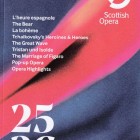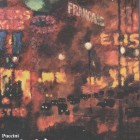Bohème 2025Scottish Opera
Read more about the opera Bohème
This staging of the old classic was launched in 2017, and here had its first revival, no doubt gaining in sharpness from the return of the original production team. Given a setting of Paris in the 1920s, it worked surprisingly well. For evidence of its quality we only need to see that company chief Stuart Stratford returned to conduct, and that the original Mimi, Hye-Youn Lee, was also on hand, and just as touching as last time.
The orchestra was quite superb, with a beautifully subtle rendering of the score. The chorus seemed larger than usual, making a big impact in the opening scene as tourists, as well as in their big moment in the Café Momus and its environs. One hopeful sign for the future was Scottish Opera's new children's chorus, who will presumably appear in a number of appropriate works in future years.
As before, the performance began without the orchestra, the crowd being entertained by Musetta's singing to the accompaniment of an excellent accordionist (still Djorje Gajic). The big change here was that where in 2017 Musetta gave a decent impersonation of the great Josephine Baker, now Rhian Lois was intended to remind us of the immortal Edith Piaf. She was taller than the original, no doubt, but the voice sounded right and the little black dress was unmistakeable. The prelude then began, played on a scratchy 78, with the orchestra joining in seamlessly before taking over. This was highly effective, if not, perhaps, suitable for every staging. The contrast between the sparrow-like Musetta of that opening and the glamorous figure in the café was quite striking.
Mario Chang is a tenor from Guatemala making his British debut. He has already sung several parts at the Met, including Nemorino, and has also sung in Los Angeles and Santa Fe as well as several major roles at Frankfurt. His acting was appropriately detailed and he has just the right voice for the part.
Roland Wood first sang Marcello at the beginning of his career in an Opera-Go-Round staging with piano, but now, at last, got to perform the work complete with orchestra - one audience member commented 'better late than never'. Callum Thorpe first joined the company for Oedipus Rex at last year's Edinburgh Festival. He has a fine, resonant bass, and the moving farewell to his coat was a highlight of the last act. Edward Jowle has recently joined Scottish Opera's Emerging Artist programme. He has a heavy schedule of roles through the season, culminating in Mozart's Figaro. His Schaunard was a very touching figure, as he should be, much affected by the drama going on around him.
The direction seemed tighter this time - the device of the drama being 'Mimì's dream' seemed clearer. Jamie MacDougall, clearly now well-established as the company's resident 'old buffer', had great fun doubling mean landlord and sugar daddy. The staging also gained from the presence of several actors given cameo parts, including veteran chorister Declan McCusker in the second act.
The Edinburgh audience (Saturday evening) was every bit as crowded and enthusiastic as had been the Glasgow matinee crowd.
There were fifteen performances spread over the four cities that have suitable theatres - Glasgow, Aberdeen, Inverness and Edinburgh. A further experiment with scheduling was introduced. Aberdeen joined Edinburgh and Glasgow in having a 3pm matinee. In Inverness the early performance started at 5pm. These changes must both made it easier for those many audience members that travel long distances.
Scottish Opera's programme for 2025/26
The most obvious novelty is a world premiere with a uniquely Japanese theme. The Great Wave has music by Dai Fujikura and a text by Harry Ross with a central theme derived from the famous print by Hokusai.
The season opens with new productions of an interesting double bill of works by two great twentieth century masters, Maurice Ravel and William Walton. Scottish Opera did give us L'Heure espagnole as long ago as 1963, the company's second season, but Walton's operas, including his late comedy The Bear, have been conspicuous omissions.
As usual two popular favourites are given extended runs that include performances in Aberdeen and Inverness, as well as Glasgow and Edinburgh. The autumn revival is Renaud Doucet and André Barbe's thoroughly enjoyable staging of La bohème, first seen in 2017. The spring tour is one of the company's best productions, first seen in 2010 - Sir Thomas Allen's visionary interpretation of The Marriage of Figaro, which he is returning to work on.
There is a long-awaited return to the works of Wagner, with two concert performances of Tristan und Isolde, while a concert programme of excerpts this year is centred on Tchaikovsky.
The company's small-scale activities continue with autumn and spring tours of a Highlights programme. The Pop-Up Opera series also continues to spread the length and breadth of the country.
Performance Cast
Production Cast
- Conductor
-
Stuart Stratford (Exc Oct 21; Nov 20)
Toby Hession (Oct 21; Nov 20)
- Director
- Designer - Sets
- Designer - Costumes
- Lighting
- Orchestra
- Sponsor
Performance DatesBohème 2025
Theatre Royal, Glasgow | Glasgow
11 Oct, 19.15 15 Oct, 19.15 19 Oct, 15.00 21 Oct, 19.15 23 Oct, 19.15 25 Oct, 19.15
His Majesty's Theatre, Aberdeen | Aberdeen
30 Oct, 19.15 1 Nov, 15.00
Eden Court Theatre | Inverness
6 Nov, 19.15 8 Nov, 17.00
Festival Theatre, Edinburgh | Edinburgh
14 Nov, 19.15 16 Nov, 15.00 18 Nov, 19.15 20 Nov, 19.15 22 Nov, 19.15

